新概念英语第一册73课课件精品名师资料
合集下载
新概念第一册L73-74最详细课件

Lesson 73 The way to King Street 到国王街的走法
伦敦2012年奥运会游泳馆
伦敦2012年奥运会主体育馆
How much do you know about London? 别名: 雾都 行政区类别: 英国首都 所属地区: 大不列颠及北爱尔兰联合王国 面积: 1,577.3平方公里(大伦敦) 人口: 751.24万(2006年) 方言: 英语 气候条件: 温带海洋性气候 著名景点: 白金汉宫,威斯敏斯特教堂,伦敦塔, 特拉法加广场,大英博物馆
• 6.Where's my watch? I can't______it. • A, look for B, find C, find out D, look • 7.My father ______his hand into the bag, and _____out a story book. • A, putted; taked B, put; take C, put; took D, putting; taking • 8.The waiter smiled______and showed me the menu. • A, pleasantly B, friendly C, pleasant D, friend • 9.It suddenly started to rain. We rain into the house___. • A, hurry B, hurried C, hurriedly D, in hurry • 10.John can speak English_______. • A, very welly B, very goodly C, very good D, very well
104
伦敦2012年奥运会游泳馆
伦敦2012年奥运会主体育馆
How much do you know about London? 别名: 雾都 行政区类别: 英国首都 所属地区: 大不列颠及北爱尔兰联合王国 面积: 1,577.3平方公里(大伦敦) 人口: 751.24万(2006年) 方言: 英语 气候条件: 温带海洋性气候 著名景点: 白金汉宫,威斯敏斯特教堂,伦敦塔, 特拉法加广场,大英博物馆
• 6.Where's my watch? I can't______it. • A, look for B, find C, find out D, look • 7.My father ______his hand into the bag, and _____out a story book. • A, putted; taked B, put; take C, put; took D, putting; taking • 8.The waiter smiled______and showed me the menu. • A, pleasantly B, friendly C, pleasant D, friend • 9.It suddenly started to rain. We rain into the house___. • A, hurry B, hurried C, hurriedly D, in hurry • 10.John can speak English_______. • A, very welly B, very goodly C, very good D, very well
104
新概念英语NCE1_lesson73-74课件
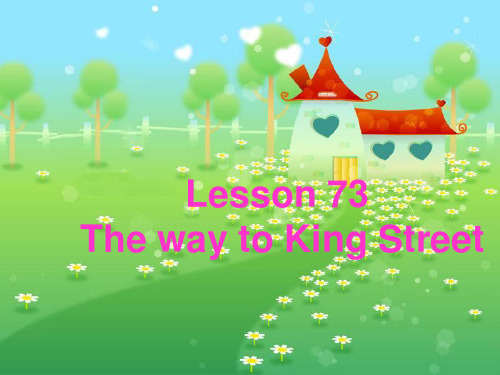
注:直接引用说话者的话叫做直接引语
5. see:看见,强调结果,see sth. look:看,强调动作,look at sth. hear-listen find-look for
6. ask sb. sth. 问某人某事。 eg:He asked the teacher a question.
Lesson 73 The way to King Street
• Listen to the tape then answer this question.
• Why did the man need a phrasebook?
New words and expressions:
• week n.周 • London n.伦敦 • suddenly adv.突然地 • bus stop 公共汽车站 • smile v.微笑 • pleasantly adv.愉快地
一般过去时 基本结构:主语+动词过去式+其他; 否定形式:
①was/were + not; ②在动词前加didn‘t,同时还原动词;
一般疑问句:
①Was/Were+主语+其他 ②Did+主语+do+其他。
特殊疑问句:
特殊疑问词+ was/were +主语...? 特殊疑问词+ did +主语+do...?
do
He spoke German. He was a tourist.
speak
is
Then he put his hand into pocket, put
and took out a phrasebook. take
put… into… 把…放进…中 take…out of… 把…从…中取出
5. see:看见,强调结果,see sth. look:看,强调动作,look at sth. hear-listen find-look for
6. ask sb. sth. 问某人某事。 eg:He asked the teacher a question.
Lesson 73 The way to King Street
• Listen to the tape then answer this question.
• Why did the man need a phrasebook?
New words and expressions:
• week n.周 • London n.伦敦 • suddenly adv.突然地 • bus stop 公共汽车站 • smile v.微笑 • pleasantly adv.愉快地
一般过去时 基本结构:主语+动词过去式+其他; 否定形式:
①was/were + not; ②在动词前加didn‘t,同时还原动词;
一般疑问句:
①Was/Were+主语+其他 ②Did+主语+do+其他。
特殊疑问句:
特殊疑问词+ was/were +主语...? 特殊疑问词+ did +主语+do...?
do
He spoke German. He was a tourist.
speak
is
Then he put his hand into pocket, put
and took out a phrasebook. take
put… into… 把…放进…中 take…out of… 把…从…中取出
新概念英语第一册一年级上册Lesson73-78课件

_______a phrase book.
1. 我能等,但我的牙痛却不能等。
I _c_a__n__ w__a_i_t__, but my toothache __c_an’_t__.
2. 我想看牙医。
I want ___t_o_______ se_e____ the dentist , please.
5. late ---- late
11. bad ---- badly
6. slow---- slowly
汉译英。
• 1. 上星期她到伦敦去了。
• __L__a_s_t_ week she _w__e_n_t__ __t_o____London.
• 2. 忽然,她在公共汽车站附近看见一个男人。
• Su_d_d_e_n__ly_ , she ___s_a_w__ a man __n__e_a_r_a bus stop .
• 1.女人总是穿不舒坦的鞋子。 • Women always wear uncomfortable shoes. • 2.你就不能等到今天下午吗? • Can't you wait till this afternoon? • 3.我想要看牙医。 • I want to see the dentist. • 4.你能下午4点来吗? • Can you come at 4p.m.?
一般过去时
Make sentences:
She I He They
• went to London • lost her way • saw a man • smiled pleasantly • spoke German • was a tourist • put his hand into his pocket • bought this pair of shoes
1. 我能等,但我的牙痛却不能等。
I _c_a__n__ w__a_i_t__, but my toothache __c_an’_t__.
2. 我想看牙医。
I want ___t_o_______ se_e____ the dentist , please.
5. late ---- late
11. bad ---- badly
6. slow---- slowly
汉译英。
• 1. 上星期她到伦敦去了。
• __L__a_s_t_ week she _w__e_n_t__ __t_o____London.
• 2. 忽然,她在公共汽车站附近看见一个男人。
• Su_d_d_e_n__ly_ , she ___s_a_w__ a man __n__e_a_r_a bus stop .
• 1.女人总是穿不舒坦的鞋子。 • Women always wear uncomfortable shoes. • 2.你就不能等到今天下午吗? • Can't you wait till this afternoon? • 3.我想要看牙医。 • I want to see the dentist. • 4.你能下午4点来吗? • Can you come at 4p.m.?
一般过去时
Make sentences:
She I He They
• went to London • lost her way • saw a man • smiled pleasantly • spoke German • was a tourist • put his hand into his pocket • bought this pair of shoes
新概念英语一册第73-74课件

['pɔkit] n. 口袋;钱;容器 adj. 小型的,袖珍的;
cut [kʌt] vt. 切割;削减; vi. 切割 n. 伤口;切口
phrase [freiz] n. 成语;习语;措词 vt. 用短语表达;用语言表
phrasebook n. 常用语手册,短语手册
slowly adv. 缓慢地,慢慢地
——Raina
Introduction and give name
What's matter with them ?
They lost their way.
Lesson 73 The way to King Street
到国王街的走法
1. week n. 周 this week 这周 last week 上周 next week 下周
'Excuse me ,' she said.
'Can you tell me the way to King Street,pleas?'
The man smiled pleasantly. He did not understand English. He spoke German.
Then he put his hand into his pocket, and took out a phrasebook.
bus stop 公交汽车车站
train station
火车站
smile [sm:f] n. 笑;引人发笑的事或人 vi. 笑 laugh at + sb.嘲笑某人
speak
[spi:k]
vi. 说话;演讲;陈述;表明 vt. 讲话;发言;讲演
新概念英语第一册7月73&74课精品课件!
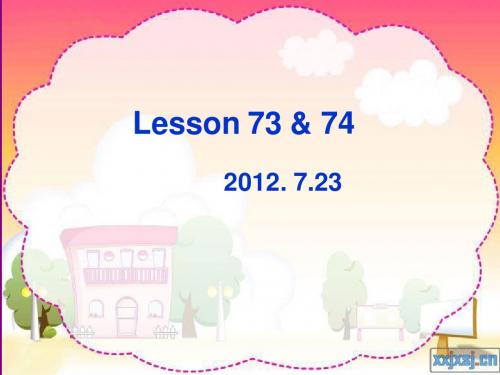
Listen to the flash then answer this question:
• First: only listen, then answer: • Why did the man need a phrasebook? • Then: Listen again: then answer more questions. 分3段来听。
Open your book and look at Part A : try to finish it. Finish the exercises of Part B on Page 152.
Байду номын сангаас
Listen to the tape!
• Listen and repeat!
• 副词的用法: • 作用:副词是通过修身动词或者形容词来进一步强调 该动作或形容词的程度。 • 位置:一般来说,副词放在动词之后形容词之前。 (形前动后) 变换方法: 一,直接在形容词后加ly。 quick:quickly 二,以辅音字母加y结尾的形容词后边y为i加ly: hungry-hungrily。 三,有些词形容词和副词形式一样: late, fast
带有实义动词的过去时态
描述在某个过去时间发生的而现在已经结束的动作 1. 一般过去时: 分为两种:带有be动词的,和带有实义动词的 He was at the butcher’s yesterday. He turned off the TV last night.
2. 肯定句结构: 主语+动词的过去分词+宾语+其它+表示过去的时间 3. 否定句结构:借助于助动词did,did后加not:缩写为didn’t: He didn’t turn off the TV last night. 4. 一般疑问句结构;借助于助动词did: Did +主语+动词原形+宾语+其它成分: 肯定回答:Yes,主语+did. 否定回答:No, 主语+didn’t. Did he turn off the TV last night? Yes, he did./ No, he didn’t.
新概念英语第一册73课ppt课件

副词(adv.)是补充动词(v.)的意义的。 副词(adv.)通过修饰动词(v.)告诉我们句中某个动作的情况,也就是 告诉我们某事如何,何时,何地等发生过进行的。
最新编辑ppt
18
一、根据句意及所给的单词的首字母填空 1. Mrs. Mill does not know London very w_e_ll and she lost her way. 2. Can you tell me the w_a_y to King Street, please? 3. He was Italian. He did not u_n_d_e_rs_t_a_n_d English. 4. The old man is walking s__lo_w_ly_. 5. He shaved hurriedly this morning and cut h_im_s_e_lf_ badly.
How can I get to ......? Where is ......? How to get to ...?
Can you tell me how to get to King Street, please? Excuse me, how can I get to King Street?
最新编辑ppt
10
The man smiled pleasantly. [aɪ] [e] [ɪ]
He did not understand English!
[ʌ] [ə] [æ ] He spoke German.
[əʊ] He was a tourist.
smile[smaɪl]v. 微笑
pleasantly['plezntlɪ]adv. 愉快地
最新编辑ppt
最新编辑ppt
18
一、根据句意及所给的单词的首字母填空 1. Mrs. Mill does not know London very w_e_ll and she lost her way. 2. Can you tell me the w_a_y to King Street, please? 3. He was Italian. He did not u_n_d_e_rs_t_a_n_d English. 4. The old man is walking s__lo_w_ly_. 5. He shaved hurriedly this morning and cut h_im_s_e_lf_ badly.
How can I get to ......? Where is ......? How to get to ...?
Can you tell me how to get to King Street, please? Excuse me, how can I get to King Street?
最新编辑ppt
10
The man smiled pleasantly. [aɪ] [e] [ɪ]
He did not understand English!
[ʌ] [ə] [æ ] He spoke German.
[əʊ] He was a tourist.
smile[smaɪl]v. 微笑
pleasantly['plezntlɪ]adv. 愉快地
最新编辑ppt
新概念第一册73-74课课件 Sally

• week n.周 • London n.伦敦 • suddenly adv.突然地 • bus stop 公共汽车站 • smile v.微笑 • pleasantly adv.愉快地
e.g. The man smiled pleasantly. • 这人友好地笑了笑。 • understand v.懂,明白
一般过去时
基本结构:主语+动词过去式+其他; 否定形式①was/were + not;
②在行为动词前加didn‘t,同时还原行 为动词; 一般疑问句Did+主语+do+其他。
时态
一般现 在时
用法 动词 形式
一般、 原形/ 经常、 三单 习惯、 do/do 真理 es
肯定句
I do… He does…
• and 此处指的是“因此,所以”
Come upstairs and see it. • 这里的and指的是“目的”
• 4. lose one’s way 迷路(丢失了某人的 路)。lose的过去式是lost
• 5. She does not know London very well, and she lost her way. 这里的and相当于 so。
Did the man smile?
Yes, he did .He smiled pleasantly.
What did the man do?
He put his hand into his pocket and took out a phrasebook.
New words and expressions:
• 他翻开书找到了一条短语。他缓慢地读 着短语。 ”很抱歉,“他说,”我不会讲英 语。”
e.g. The man smiled pleasantly. • 这人友好地笑了笑。 • understand v.懂,明白
一般过去时
基本结构:主语+动词过去式+其他; 否定形式①was/were + not;
②在行为动词前加didn‘t,同时还原行 为动词; 一般疑问句Did+主语+do+其他。
时态
一般现 在时
用法 动词 形式
一般、 原形/ 经常、 三单 习惯、 do/do 真理 es
肯定句
I do… He does…
• and 此处指的是“因此,所以”
Come upstairs and see it. • 这里的and指的是“目的”
• 4. lose one’s way 迷路(丢失了某人的 路)。lose的过去式是lost
• 5. She does not know London very well, and she lost her way. 这里的and相当于 so。
Did the man smile?
Yes, he did .He smiled pleasantly.
What did the man do?
He put his hand into his pocket and took out a phrasebook.
New words and expressions:
• 他翻开书找到了一条短语。他缓慢地读 着短语。 ”很抱歉,“他说,”我不会讲英 语。”
新概念英语第一册Lesson 73 The way to King Street课件(共2
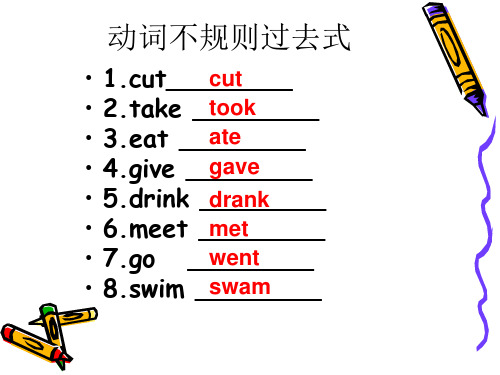
He _s_m__il_e_d___ __p_le_a_s_a_n_t_ly.
He _d_id_n_’_t____ _u_n_d_e_r_s_t_a_nd English.
He _s_p__o_k_e___ German.
took out
put…into pocket
and found a phrase
动词不规则过去式
• 1.cut___c_u_t___ • 2.take __to_o_k____ • 3.eat __a_t_e____ • 4.give __g_a_ve____ • 5.drink _d_ra_n_k____ • 6.meet _m_e_t_____ • 7.go __w_e_n_t ___ • 8.swim _s_w_a_m____
ask sb. the way
上周
去伦敦
对…了解 对…很了解 迷路了 在车站附近 向他问路 向某人问路
7. say to oneself
心中暗想/ 心想
8. the way to street
去国王街的路
the e the way to …
9. put …你in能to告…诉我到…怎么走吗?
动词不规则过去式变化
• 1.lose— lost • 2.see — saw • 3.tell-- told • 4.understand-- understood • 5.speak— spoke • 6.put-- put • 7.find— found • 8.read-- read /red/
副词
• cut badly • eat quickly • drink thirstily • go slowly • greet warmly
新概念英语NCE1_lesson73-74(共23页)课件

•
• Listen to the tape then answer this question.
• Why did the man need a phrasebook?
• ห้องสมุดไป่ตู้.\..\总新概念一\新一动画\新概念英语第一 册下(动画)073.flv
Last week, Mrs. Mills went to London . She does not know London very well, and she lost her way .
The man smiled pleasantly. He did not understand English!
He spoke German. He was a tourist.
Then he put his hand into his pocket,
and took out a phrasebook.
He opened the book and found a phrase.
He read the phrase slowly. “I am sorry,” he said . “ I
do not speak English.”
动词原形及其过去式
• read, read • say, said • speak, spoke • find, found • go, went
put, put tell, told take, took see, saw understand, understood
• Read after the tape, sentence by sentence.
• 分组朗读。
Lesson 74 1. Where did Mrs. Mills go? 2. When did she go? 3. what did they do?
• Listen to the tape then answer this question.
• Why did the man need a phrasebook?
• ห้องสมุดไป่ตู้.\..\总新概念一\新一动画\新概念英语第一 册下(动画)073.flv
Last week, Mrs. Mills went to London . She does not know London very well, and she lost her way .
The man smiled pleasantly. He did not understand English!
He spoke German. He was a tourist.
Then he put his hand into his pocket,
and took out a phrasebook.
He opened the book and found a phrase.
He read the phrase slowly. “I am sorry,” he said . “ I
do not speak English.”
动词原形及其过去式
• read, read • say, said • speak, spoke • find, found • go, went
put, put tell, told take, took see, saw understand, understood
• Read after the tape, sentence by sentence.
• 分组朗读。
Lesson 74 1. Where did Mrs. Mills go? 2. When did she go? 3. what did they do?
新概念第一册73课课件

伦敦塔曾作为堡垒、军械库、国库、铸币厂、宫 殿、天文台、避难所和监狱,特别关押上层阶级 的囚犯。最后的这一用途产生一条短语“sent to the Tower”,意思是“入狱”
倫敦塔Tower of London
—— The White
Tower
The White Tower, which gives the entire castle its name, was built by William the Conqueror in 1078, the White Tower has been described as "the most complete eleventh-century palace in Europe".
We cannot start the manufacture. On one hand, we don’t have sufficient material, on the other hand, the material that we have is expired.
★lose v. (使)迷路 ① v. 迷失;(使)迷路
词 the week before last 上上周 the week after next 下下周 ★suddenly 我们正通着电话,突然电话断了。
We were talking on the phone when, suddenly, the line went dead. 我突然想起我没有带钥匙。
In 1978Henry Laurence closed the only one American prisoners
The Tower of London is no longer limited to the royal family, but still retains the royal residence, so there will be sentries here at.
倫敦塔Tower of London
—— The White
Tower
The White Tower, which gives the entire castle its name, was built by William the Conqueror in 1078, the White Tower has been described as "the most complete eleventh-century palace in Europe".
We cannot start the manufacture. On one hand, we don’t have sufficient material, on the other hand, the material that we have is expired.
★lose v. (使)迷路 ① v. 迷失;(使)迷路
词 the week before last 上上周 the week after next 下下周 ★suddenly 我们正通着电话,突然电话断了。
We were talking on the phone when, suddenly, the line went dead. 我突然想起我没有带钥匙。
In 1978Henry Laurence closed the only one American prisoners
The Tower of London is no longer limited to the royal family, but still retains the royal residence, so there will be sentries here at.
新概念英语第一册7月73&74课精品课件!
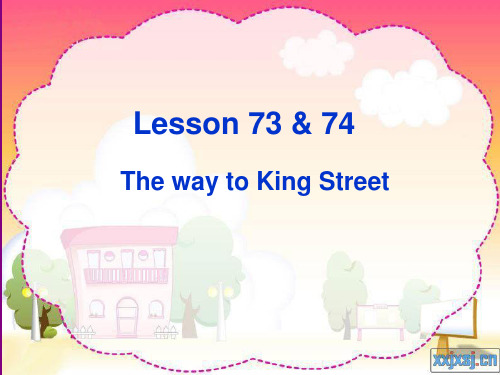
Exercises:
Open your book and look at Part A : try to finish it. Finish the exercises of Part B on Page 152.
1. Recite the dialogue. 2. Finish the related exercise. 3. Learn the new words by heart.
Lesson 74
• 1 hurriedly ad.匆忙地: hurry:adj. 短语: in a hurry:She goes to work in a hurry. • 2 cut v.割,切 过去分词:cut-cut • 3 thirstily ['θə:stili] ad.口渴地 • thirsty:adj. : I am very thirsty. • So I drank the water thirstily. • 4 go [gəu] v.走 : Don't let go. 别放弃! • Let go!放手! • 5 greet [gri:t] v.问候,找招呼 • greet sb.:跟某人打招呼。 • She greet me warmly.
• He , open the book, find a phrase • He, read it, slow • "I, sorry , I, not speak English"
Listen to the tape!
• Listen and repeat!
• 副词的用法: • 作用:副词是通过修身动词或者形容词来进一步强调 该动作或形容词的程度。 • 位置:一般来说,副词放在动词之后形容词之前。 (形前动后) 变换方法: 一,直接在形容词后加ly。 quick:quickly 二,以辅音字母加y结尾的形容词后边y为i加ly: hungry-hungrily。 三,有些词形容词和副词形式一样: late, fast
新概念英语第一册第73课.ppt
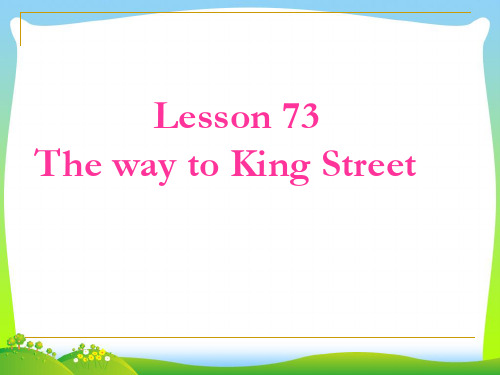
phrasebook /freɪz/ 短语手册
pocketˈ /pɒkɪt/ 口袋
speak /spiːk/ 说
watch the video and answer these questions.
Where did Mrs. Mill go last week? Why did the man need a phrasebook? What’s the man’s job(工作)? role playing
put-put, take-took put… into… 把…放进…中去 take.. out... 把... 拿出来。 slowly 副词(adv) 修饰动词 read , slow- slowly,以y结尾的, happy-happily
He read the book slow.
know-knew 例句:I know him very well. I don’t know the city very
well.
lose one’s way 迷路(丢失了某人的路)。 lose my way, lose our way lose-lost. 这里的and相当于so。不翻成和
suddenly 既可以放在句首,也可以放在句中或 句末。 see-saw see看见,near 在附近。 near our school
Did he speak German? spoke 变成了原形
speak-spoke speak:说某种语言speak English, German 同某人通电话speak to sb. tell:告诉、告知。tell sb. sth. say: 说话(一件事) say sth. / She said, ‘…’ She ___ me she was 18 years old. She said ‘ Thank you very much.’ She wanted to ___ to me.
新概念一Lesson 73 (共43张PPT)

taxes you risk going to prison.
逃学
• play truant • evade school • skip class • play hooky
Lesson 73 the record-holder
• Little boys who play truant from school are unimaginative. A quiet day's fishing, or eight hours in a cinema seeing the same film over and over again, is usually as far as they get. They have all been put to shame by a boy who, while playing truant, travelled 1600 miles. He hitch- hiked to Dover and, towards evening, went into a boat to find somewhere to sleep. When he woke up next morning, he discovered that the boat had, in the meantime, travelled to Calais. No one noticed the boy as he crept off.
• as far as表示“到……程度”、“就 ……而言”
• 是连词,与 距离没有关系
• 就我所知,他的手术是成功的。 • As far as I know, his operation is
successful.
No one noticed the boy as he crept off.
逃学
• play truant • evade school • skip class • play hooky
Lesson 73 the record-holder
• Little boys who play truant from school are unimaginative. A quiet day's fishing, or eight hours in a cinema seeing the same film over and over again, is usually as far as they get. They have all been put to shame by a boy who, while playing truant, travelled 1600 miles. He hitch- hiked to Dover and, towards evening, went into a boat to find somewhere to sleep. When he woke up next morning, he discovered that the boat had, in the meantime, travelled to Calais. No one noticed the boy as he crept off.
• as far as表示“到……程度”、“就 ……而言”
• 是连词,与 距离没有关系
• 就我所知,他的手术是成功的。 • As far as I know, his operation is
successful.
No one noticed the boy as he crept off.
新概念第一册课件73-74
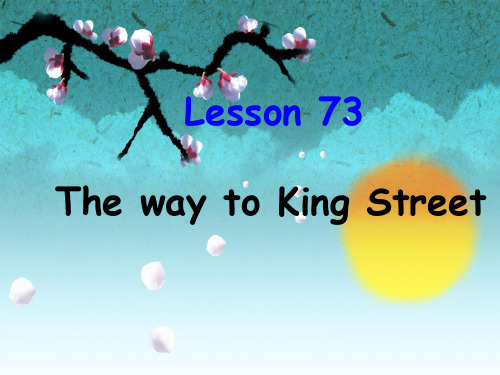
★ week n. 周 /wi:k/
this week, last week, (前面不能加介词) the week before last 上上周 the week after next 下下周
★
London /'lʌndən/ n. 伦敦 英国的首都
2018/3/10
★
/'sʌdnli/ adv. 突然地 既可以放在句首, 也可以放在句中或句末。 sudden adj. 突然的 We are talking on the phone when suddenly the line go dead. 我们在电话上聊的时候,突然断线了。 I suddenly remembered that I didn't bring my key. 我突然想起来我忘记带钥匙了。
2018/3/10
10. tell sb. sth. 告诉某人某事 tell的过去式是told
The teacher tells us to do our homework.
2018/3/10
11. the way to… 去某地的路,去某地的走法 I know the way to school. 我知道去学校的路
speak /spi:k/ (spoke /spəuk/) v. 讲,说 hand /hæ nd/ n. 手 pocket /'pɔkit/ n. 衣袋 phrasebook /'freizbuk/ n. 短语手册, 常用语手册 phrase /'freiz/ n. 短语 slowly /'sləuli/ adv. 缓慢地
★ smile
n. &v. 笑
★ pleasantly adv.愉快地 /'plesəntli/ She smiled a pleasant smile. =She smiled pleasantly.
新概念第一册第73课(共37张PPT)

5
Listen to the tape and answer the question: why did the man need a phrasebook?
073&074-The Way to King Street.mp3
6
Week London Suddenly Bus stop Smile pleasantly
4.Jill’s father __ga_ve__(give) her the key to the front door.
ls _w_a_s_(is) in London last week.
33
6.She __we_n_t (go) to Paris last year . 7.The man _d_r_un_k_ (drink) their tea very quickly. 8.We __s_aw_ (see) our friends at the bus stop. 9. The students_u_n_d_er_st_ood (understand) me because I
17
1. week n. 周 this week last week the week before last 上上周 the week after next 下下周
18
2. She does not know London very well, and she lost her way.
it thirstily.
27
我给他一块蛋糕, 他吃得很快.
What did he do yesterday afternoon? I gave him a cake and he ate it quickly.
Listen to the tape and answer the question: why did the man need a phrasebook?
073&074-The Way to King Street.mp3
6
Week London Suddenly Bus stop Smile pleasantly
4.Jill’s father __ga_ve__(give) her the key to the front door.
ls _w_a_s_(is) in London last week.
33
6.She __we_n_t (go) to Paris last year . 7.The man _d_r_un_k_ (drink) their tea very quickly. 8.We __s_aw_ (see) our friends at the bus stop. 9. The students_u_n_d_er_st_ood (understand) me because I
17
1. week n. 周 this week last week the week before last 上上周 the week after next 下下周
18
2. She does not know London very well, and she lost her way.
it thirstily.
27
我给他一块蛋糕, 他吃得很快.
What did he do yesterday afternoon? I gave him a cake and he ate it quickly.
- 1、下载文档前请自行甄别文档内容的完整性,平台不提供额外的编辑、内容补充、找答案等附加服务。
- 2、"仅部分预览"的文档,不可在线预览部分如存在完整性等问题,可反馈申请退款(可完整预览的文档不适用该条件!)。
- 3、如文档侵犯您的权益,请联系客服反馈,我们会尽快为您处理(人工客服工作时间:9:00-18:30)。
回题问答:
1.Why did the man need(需要) a phrasebook? 2.Where did Mrs Mills go last week? 3.What language(语言)did the man speak? 4.What is the man’s job?
Last week Mrs. Mills went to London. She does not know London very well, and she lost her way. Suddenly, she saw a man near a bus stop. 'I can ask him the way.' she said to herself. 'Excuse me,' she said. 'Can you tell me the way to King Street, please?' The man smiled pleasantly. He did not understand English! He spoke German. He was a tourist. Then he put his hand into pocket, and took out a phrasebook He opened the book and found a phrase. He read the phrase slowly. 'I am sorry,' he said. 'I do not speak English.'
他不懂英语
New Word and expressions 生词和短语 week 周 名词: 短语 know…well很了解 pocket衣袋 put …into放入。。。 phrasebook短语手册 take out拿出 phrase短语 London 伦敦 say to oneself自言自语 hand手 German德语 lose one’s way迷路 tourist旅行者 bus stop公共汽车站 find发现 open打开 动词 smile 微笑 understand 副词 suddenly突然地 (understood)懂,明白 slowly缓慢地 speak (spoke)讲,说 pleasantly愉快地
3.He opened the book and found a phrase. 他翻开书找到了一条短语。
4.She does not know London very well, and she lost her way.
她对伦敦不很熟悉,因此迷了路。
5.He did not understand Engliቤተ መጻሕፍቲ ባይዱh
London She does not______ know Last week __________Mrs. Mills went to________. London__________, very well and she_____________. lost her way __________, Suddenly she saw a man near a________. bus stop 'I can ask him said to herself. the way.' she _________________ 'Can you tell me the way 'Excuse me,' she said. ________________________to King Street, please?' The man smiled_________. pleasantly He did not_______________! understand English German He was a tourist. He spoke_________. his pocket took out Then he put his hand into_____, and ________a phrasebook. He opened the book and found a_____. phraseHe read the phrase _______. slowly 'I am sorry,' he said. 'I do not___________.' speak English
1.'Can you tell me the way to King Street, please?'
您能告诉我到国王街怎么走吗?”
2.Then he put his hand into pocket, and took out a phrasebook
然后他把手伸进了衣袋,掏出了一本常用语手册。
1.Why did the man need(需要) a phrasebook? 2.Where did Mrs Mills go last week? 3.What language(语言)did the man speak? 4.What is the man’s job?
Last week Mrs. Mills went to London. She does not know London very well, and she lost her way. Suddenly, she saw a man near a bus stop. 'I can ask him the way.' she said to herself. 'Excuse me,' she said. 'Can you tell me the way to King Street, please?' The man smiled pleasantly. He did not understand English! He spoke German. He was a tourist. Then he put his hand into pocket, and took out a phrasebook He opened the book and found a phrase. He read the phrase slowly. 'I am sorry,' he said. 'I do not speak English.'
他不懂英语
New Word and expressions 生词和短语 week 周 名词: 短语 know…well很了解 pocket衣袋 put …into放入。。。 phrasebook短语手册 take out拿出 phrase短语 London 伦敦 say to oneself自言自语 hand手 German德语 lose one’s way迷路 tourist旅行者 bus stop公共汽车站 find发现 open打开 动词 smile 微笑 understand 副词 suddenly突然地 (understood)懂,明白 slowly缓慢地 speak (spoke)讲,说 pleasantly愉快地
3.He opened the book and found a phrase. 他翻开书找到了一条短语。
4.She does not know London very well, and she lost her way.
她对伦敦不很熟悉,因此迷了路。
5.He did not understand Engliቤተ መጻሕፍቲ ባይዱh
London She does not______ know Last week __________Mrs. Mills went to________. London__________, very well and she_____________. lost her way __________, Suddenly she saw a man near a________. bus stop 'I can ask him said to herself. the way.' she _________________ 'Can you tell me the way 'Excuse me,' she said. ________________________to King Street, please?' The man smiled_________. pleasantly He did not_______________! understand English German He was a tourist. He spoke_________. his pocket took out Then he put his hand into_____, and ________a phrasebook. He opened the book and found a_____. phraseHe read the phrase _______. slowly 'I am sorry,' he said. 'I do not___________.' speak English
1.'Can you tell me the way to King Street, please?'
您能告诉我到国王街怎么走吗?”
2.Then he put his hand into pocket, and took out a phrasebook
然后他把手伸进了衣袋,掏出了一本常用语手册。
